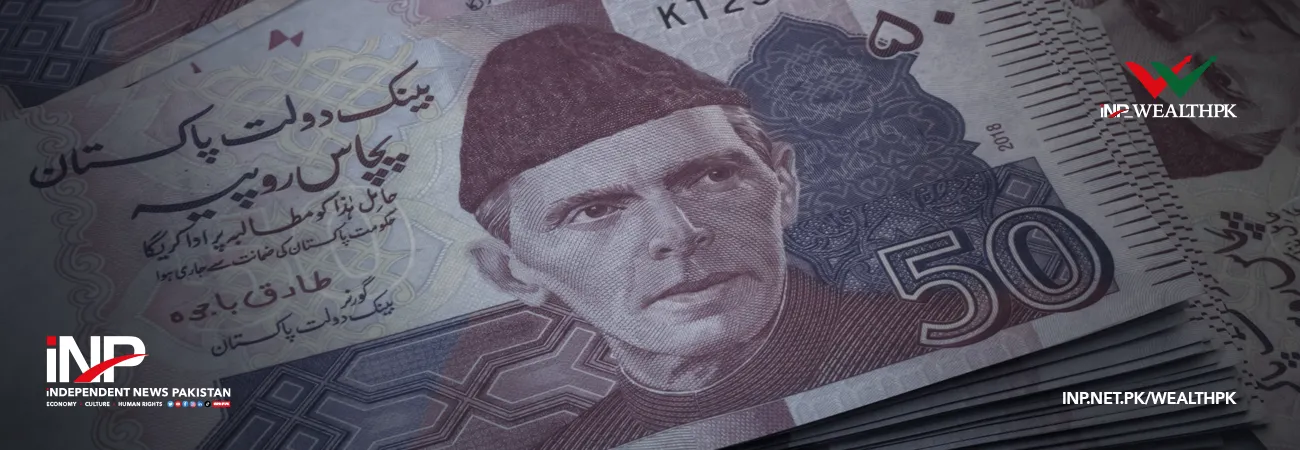INP-WealthPk
By Hamid Mahmood
ISLAMABAD, Oct. 27 (INP-WealthPK)- The Federal Board of Revenue (FBR) has exceeded the tax collection target by Rs184 billion in the first quarter, putting it on track to meet the yearly target of Rs5.829 trillion.
The Board has released the interim revenue collection figures for the first quarter of fiscal year 2021-22 (July-September).
According to statistics, net income of Rs1,395 billion was received in the first quarter, surpassing the Rs1,211 billion target, which was historic.
Gross receipts, on the other hand, improved by 37.3 percent from Rs1,059 billion in July-September 2020 to Rs1,454 billion this fiscal year.
Refunds totalled Rs59 billion from July to September 2021, up from Rs49 billion in the previous year, representing a 20.2 percent increase and reflecting the FBR's determination to expedite reimbursements. This exceptional revenue performance reflects a long-term economic recovery fuelled by the government initiatives.
Tax revenue is a major source for the government to operate smoothly. According to the Economic Survey, the tax-to-GDP ratio will increase to 10.9 percent this year from 9.6 percent last year. Since FY2010, this ratio has been hovering around 9 percent , with a few outliers when it reached 10 percent.
The tax-to-GDP ratio was recorded at 11.1 percent in FY18, which was the highest in the decade. Now that FBR almost met its all-tax revenue collection objectives till the first quarter of FY21. It is projected that the tax-to-GDP ratio will be at its highest by the conclusion of fiscal year 2021-22.
The following table shows the statistics of tax-to-GDP ratio.
 Source: Economic Survey of Pakistan
As a result of a number of policy initiatives implemented in FY2019, Pakistan's economy was shifting from stabilisation to growth prior to COVID-19. Various policy measures to boost income and wise spending management, in particular, resulted in considerable fiscal improvement in the first three quarters of FY2020.
In 2020, the COVID-19 pandemic forced the administration to reconsider its strategies in order to keep the economy afloat and help the general public.
The government framed a comprehensive set of policies in addition to striving to contain the pandemic. The goal was to reduce the economic burden brought about by the epidemic while also protecting the society’s most vulnerable members.
Despite considerable obstacles posed by increased spending to fight COVID-19, the government’s fiscal consolidation measures helped to preserve fiscal balance, increase revenues, and control spending. This will resultantly improve performance in FY2021-22.
The fiscal deficit has reduced to 3.5pc from 4.1pc compared to the previous financial year, while the primary balance remained in surplus, at Rs451.8 billion in July-March, FY2021, compared to a surplus of Rs193.5 billion the previous year.
The government will keep taking the actions necessary to achieve a faster, more sustainable, and more inclusive rate of growth. As a consequence, increased public-sector development efforts, enhanced pandemic management, vaccination roll-out, and continuation of Ehsaas Program will keep the economy growing.
Other initiatives, such as the new health and nutrition programme (Ehsaas Nashonuma), are on track, and the shock-oriented safety net (Ehsaas Tahafuz) will be spread to the other parts of the country soon.
Additional funds have been earmarked for the “National Poverty Graduation Initiative”.
Another project, "Koye Bhooka Na Soye", was introduced to assist the lowest segments of the society by providing meals to the people in need. In addition, agricultural and industrial policy packages will benefit not just their respective sectors, but also the wholesale and retail trade sub-sectors, as well as other service industries.
The banking sector's development will also be aided by special financing programmes for households, SMEs, and agriculture. Furthermore, the economy's external sector will be strengthened by reopening economies and encouraging trade.
Source: Economic Survey of Pakistan
As a result of a number of policy initiatives implemented in FY2019, Pakistan's economy was shifting from stabilisation to growth prior to COVID-19. Various policy measures to boost income and wise spending management, in particular, resulted in considerable fiscal improvement in the first three quarters of FY2020.
In 2020, the COVID-19 pandemic forced the administration to reconsider its strategies in order to keep the economy afloat and help the general public.
The government framed a comprehensive set of policies in addition to striving to contain the pandemic. The goal was to reduce the economic burden brought about by the epidemic while also protecting the society’s most vulnerable members.
Despite considerable obstacles posed by increased spending to fight COVID-19, the government’s fiscal consolidation measures helped to preserve fiscal balance, increase revenues, and control spending. This will resultantly improve performance in FY2021-22.
The fiscal deficit has reduced to 3.5pc from 4.1pc compared to the previous financial year, while the primary balance remained in surplus, at Rs451.8 billion in July-March, FY2021, compared to a surplus of Rs193.5 billion the previous year.
The government will keep taking the actions necessary to achieve a faster, more sustainable, and more inclusive rate of growth. As a consequence, increased public-sector development efforts, enhanced pandemic management, vaccination roll-out, and continuation of Ehsaas Program will keep the economy growing.
Other initiatives, such as the new health and nutrition programme (Ehsaas Nashonuma), are on track, and the shock-oriented safety net (Ehsaas Tahafuz) will be spread to the other parts of the country soon.
Additional funds have been earmarked for the “National Poverty Graduation Initiative”.
Another project, "Koye Bhooka Na Soye", was introduced to assist the lowest segments of the society by providing meals to the people in need. In addition, agricultural and industrial policy packages will benefit not just their respective sectors, but also the wholesale and retail trade sub-sectors, as well as other service industries.
The banking sector's development will also be aided by special financing programmes for households, SMEs, and agriculture. Furthermore, the economy's external sector will be strengthened by reopening economies and encouraging trade.













